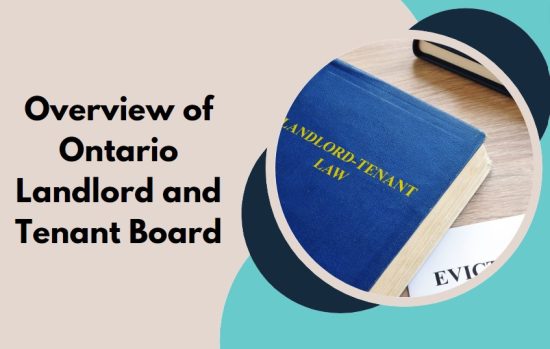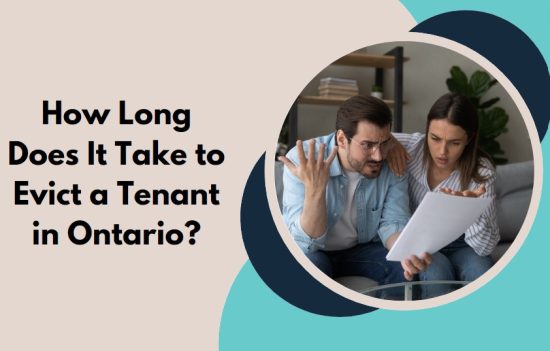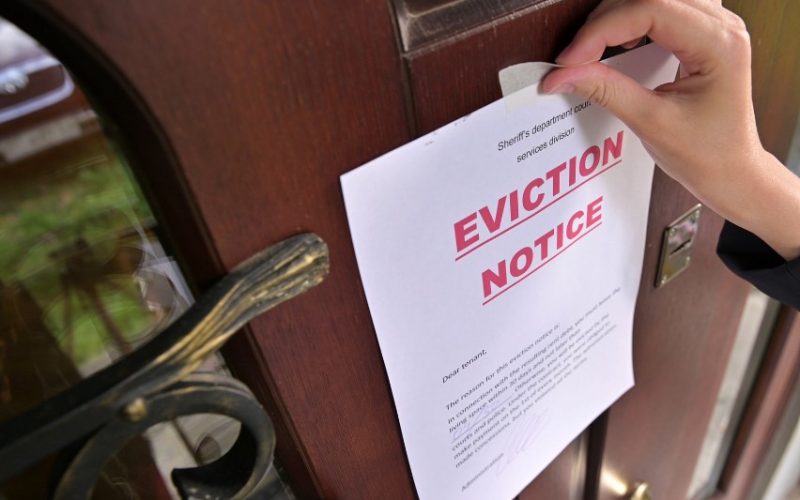Introduction
Being a landlord can be a profitable business, but dealing with difficult tenants can quickly turn your investment into a nightmare. Unfortunately, evicting a tenant in Ontario is not always an easy task and requires following specific legal procedures to avoid any complications or delays. As such, we’ve created this guide to help landlords navigate the eviction process successfully. Whether you’re facing rent arrears or property damage, read on to learn how to evict a tenant in Ontario legally and efficiently!
Overview of Ontario Landlord and Tenant Board

The Ontario Landlord and Tenant Board (LTB) is an administrative tribunal that deals with a variety of issues between landlords and tenants in Ontario. The board was created to resolve disputes, protect the rights of both parties and enforce residential tenancy laws.
As a landlord, understanding how the LTB operates is crucial for dealing with any issues related to your rental property. The board has the power to make decisions on matters such as rent increases, lease agreements, maintenance standards, eviction cases and more.
When it comes to evicting a tenant in Ontario, landlords must follow strict procedures outlined by the LTB. Failure to do so can result in legal consequences or delays in receiving an eviction order.
Landlords need to familiarize themselves with the role of the LTB and their powers. This knowledge can help them navigate any disputes that may arise during their tenancies effectively while ensuring they remain compliant with all applicable regulations.
How to Evict a Tenant in Ontario?
Evicting a tenant in Ontario is a serious matter and should be done by the law.
Here are the basic steps to follow:
- Understand the Ontario Landlord and Tenant Board (LTB) rules: The LTB is the authority that regulates landlord and tenant relationships and handles eviction disputes in Ontario. It is essential to understand their procedures, timelines, and rules before starting the eviction process.
- Serve an eviction notice: There are different types of eviction notices available in Ontario, depending on the reason for eviction. The most common type of eviction notice used by landlords in Ontario is the Notice to End Tenancy.
- Wait for the tenant’s response: After serving the eviction notice, the tenant has a specific time frame to either vacate the premises or challenge the eviction. If the tenant chooses to challenge the eviction, a hearing will be scheduled at the LTB.
- Attend the LTB hearing: Both the landlord and the tenant will have an opportunity to present their case at the LTB hearing. The Board will make a decision based on the evidence presented and the Ontario Residential Tenancies Act.
- Obtain a Writ of Possession: If the LTB issues an order to evict the tenant, the landlord needs to obtain a Writ of Possession from the court. This writ gives the landlord the legal right to take back possession of the rental unit.
- Enforce the eviction order: Once the landlord has obtained the Writ of Possession, a Sheriff will enforce the eviction order by ensuring the tenant removes their belongings and vacates the premises.
It’s important to note that the eviction process in Ontario can be complex and time-consuming. Seeking legal advice and following all the necessary procedures are crucial for a smooth and successful eviction.
How to Apply for Eviction With the Landlord and Tenant Board?
Applying for eviction with the Landlord and Tenant Board is a multi-step process.
- The first step involves serving the tenant with a notice of termination, which informs them that their tenancy will be terminated on a specific date. After the notice period has elapsed, landlords can apply for eviction.
- The application must include details such as the reason for eviction, supporting evidence and any relevant dates. The landlord must also provide proof that they have served the tenant with proper notices and followed all legal procedures.
- Once submitted, it typically takes two to three weeks before a hearing is scheduled. During this time, tenants may respond by filing their materials or disputing the landlord’s claims.
- At the hearing itself, both parties will present their case before a member of the Landlord and Tenant Board who will make a final decision. If successful, landlords can obtain an order from the board allowing them to legally evict their tenant.
- It’s important to note that there are strict rules around how applications should be filed and what information needs to be included. Seeking professional advice from experienced lawyers or paralegals could help landlords avoid potential pitfalls in this complex legal process.
How Long Does It Take to Evict a Tenant in Ontario?

The eviction process in Ontario can take some time, depending on various factors. Once a landlord applies for eviction with the Landlord and Tenant Board, it typically takes around two to three weeks for the hearing date to be set.
At the hearing, if the tenant does not contest the application or agrees to leave voluntarily, an order of termination will be issued immediately. However, if the tenant contests the application or refuses to leave after receiving an eviction notice, a hearing may be required.
If a hearing is necessary, it can take anywhere from one month up to several months for a decision to be made by the Board. This timeline depends on how complex each party’s arguments are and how busy the Board is at that time.
After a decision has been made in favour of eviction, tenants typically have 11 days to appeal. If no appeal is filed during this period or if an appeal fails after being heard by Divisional Court within 30 days of filing it then landlords can proceed with evicting their tenants.
While evicting a tenant can sometimes take longer than expected; following proper procedures and working with experienced legal professionals can help ensure success in removing problematic tenants from rental properties.
What Are the Grounds for Eviction in Ontario?
As a landlord in Ontario, there are various reasons why you may want to evict your tenant. However, before you can begin the eviction process, it is important to understand the grounds for eviction as outlined by the Landlord and Tenant Board.
- One of the most common grounds for eviction is non-payment of rent. If your tenant has failed to pay their rent on time or at all, then you have the right to initiate an eviction proceeding against them.
- Another ground for eviction is illegal activities taking place on your property. This includes drug-related activities, noise disturbance or any other activity that violates municipal by-laws.
- If your tenant causes significant damage to your property beyond normal wear and tear or fails to maintain cleanliness standards agreed upon in their lease agreement, then you also have grounds for an eviction proceeding.
- If a tenant poses a threat to safety or creates unreasonable disturbances within a community setting such as disrupting neighbours and causing unnecessary disputes between residents; this too could be considered reasonable grounds for an eviction hearing with the Landlord and Tenant Board.
- Landlords must follow proper legal processes when seeking evictions based on these grounds so that they don’t violate tenants’ rights under provincial law in Ontario.
Types of Eviction Notices for Tenants in Ontario
When it comes to evicting a tenant in Ontario, there are certain procedures that landlords must follow. One of these procedures is serving an eviction notice to the tenant.
There are different types of eviction notices for tenants in Ontario depending on the reason for eviction.
The most common types of eviction notices include:
- Notice to End Tenancy: This type of notice is used when the landlord wants to end the tenancy at the end of a fixed-term lease or if they want to terminate a month-to-month tenancy agreement.
- Notice for Non-Payment of Rent: This type of notice is served when the tenant has not paid rent on time or has missed payments altogether.
- Notice for Breach of Rental Agreement: This type of notice is given if the tenant violates any terms and conditions outlined in their rental agreement.
- Notice for Interference with Others: If a tenant causes disturbances and interferes with other tenants’ peaceful enjoyment, then this type serves as grounds for eviction.
- Termination by Landlord because Purchaser Requires Property: In situations where a landlord sells their property, they can serve this type stating that they require possession due to its sale.
It’s important to note that each situation requires specific forms and documentation presented before an application can be made at LTB; thus, you must understand which one applies best according to your case before taking legal action against your tenants under these circumstances
What to Do If the Tenant Refuses to Leave?

As a landlord, it can be frustrating when a tenant refuses to leave after receiving an eviction notice.
However, there are steps you can take to handle this situation:
- Firstly, try to communicate with the tenant and understand their reasons for not leaving. Perhaps they have financial difficulties or cannot find another place to live. If this is the case, you may want to consider offering some assistance or extending the move-out date.
- If communication fails and the tenant still refuses to leave, your next step would be applying for eviction with the Landlord and Tenant Board. The Board will then schedule a hearing where both parties can present their evidence and arguments.
- During this process, landlords must follow all legal procedures carefully as any misstep could result in delays or even dismissal of the case.
- If ultimately successful at court but still met with resistance from tenants who refuse to vacate property premises despite orders given by authorities served upon them (such as police officers), landlords should seek out enforcement remedies available under law – including obtaining writs of possession which authorize bailiffs/sheriffs taking physical possession back into landlords’ hands without further delay
Conclusion
Evicting a tenant in Ontario can be a complicated and stressful process for landlords. However, with the right knowledge of the Landlord and Tenant Board’s rules and regulations, it can be done successfully.
As we have seen in this article, there are several grounds for eviction in Ontario that landlords must follow to ensure they do not violate their tenants’ rights.
If you need to evict a tenant in Ontario, make sure you understand the legal process involved. Follow all necessary steps carefully so that you do not fall foul of any laws or regulations.
Remember to always act professionally and respectfully towards your tenants throughout the eviction process. With patience and persistence, you will eventually succeed in evicting your tenant if it becomes necessary.
We hope this guide has been helpful to all landlords facing an eviction situation. Good luck!
FAQs on how to evict a tenant in ontario
1. What is the easiest way to evict a tenant in Ontario?
The initial stage in most situations is for the landlord to give the tenant written notice that they wish the tenant to vacate. Landlords are required to provide tenancy termination notices in the correct format. There are several notices for various purposes.
2. Can I call police to evict tenant Ontario?
The law prohibits forceful eviction or lockouts by landlords, private bailiffs, or security personnel. This is only the Sheriff’s purview. You also cannot be evicted by the police. But if the sheriff believes there might be violence, he or she can call the police.
3. Can you force a tenant to move out Ontario?
Only the grounds permitted by the Act will allow a landlord to terminate a tenancy. The initial stage in most situations is for the landlord to give the tenant written notice that they wish the tenant to vacate. The Board has the appropriate forms that a landlord must use when providing a notice to end the tenancy.
4. Can a buyer evict a tenant in Ontario?
You have to hold off till the lease expires. The tenants are not required to leave, although the landlord may ask if they do. You can also agree on a closing date that corresponds with the end of the lease to acquire an empty home.










